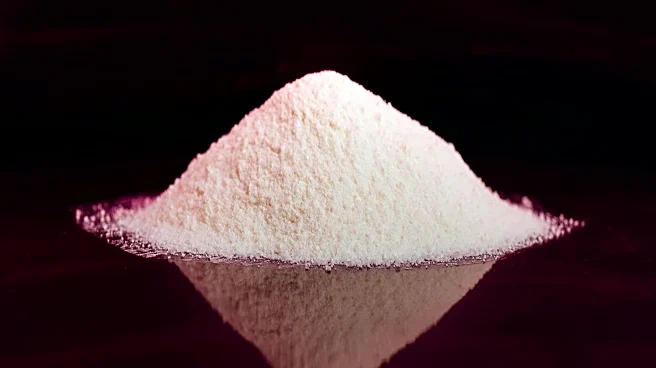What's Happening?
A recent investigation by Consumer Reports has revealed that many popular protein powders and shakes contain high levels of toxic heavy metals, including lead, cadmium, and arsenic. The report tested 23 protein powders and ready-to-drink shakes from various
brands, finding that more than two-thirds contained more lead in a single serving than what is considered safe for a full day. Some products had lead levels exceeding the recommended daily limit by over 10 times. The Food and Drug Administration does not currently set federal limits for heavy metals in most food products, including protein powders, although it monitors contaminants through ongoing testing programs. The report highlighted specific products, such as Naked Nutrition’s Vegan Mass Gainer and Huel’s Black Edition, for having the highest levels of lead. Health experts expressed concern over the potential health risks associated with repeated exposure to these metals, which can lead to serious health problems like kidney damage and high blood pressure.
Why It's Important?
The findings from Consumer Reports are significant as they highlight potential health risks associated with the consumption of protein powders, a staple in many Americans' fitness and dietary routines. The presence of toxic metals in these products poses a threat, particularly to vulnerable groups such as children and pregnant individuals. The lack of enforceable federal regulations on heavy metals in food products underscores the need for increased scrutiny and potential policy changes to ensure consumer safety. Companies involved have responded to the findings, with some asserting the safety of their products and others taking steps to address the concerns raised. This investigation may prompt consumers to reconsider their protein sources, opting for whole foods instead, and could lead to increased demand for regulatory oversight in the industry.
What's Next?
Following the report, there may be increased pressure on regulatory bodies like the FDA to establish enforceable limits for heavy metals in food products, including protein powders. Companies may also face scrutiny and potential reformulation of their products to meet safety standards. Consumer awareness and advocacy could drive changes in purchasing habits, with a shift towards safer, whole food-based protein sources. The industry might see a rise in third-party testing and certification to assure consumers of product safety. Additionally, ongoing research and monitoring of heavy metal levels in food products could become more prevalent, influencing future regulations and industry practices.
Beyond the Headlines
The investigation into protein powders raises broader questions about food safety and the adequacy of current regulations in protecting consumers from harmful substances. It highlights the ethical responsibility of companies to ensure product safety and transparency. The findings could lead to a cultural shift in how consumers approach dietary supplements, emphasizing the importance of informed choices and the potential risks of relying on processed products. Long-term, this could influence industry standards and consumer expectations, driving innovation towards safer and more natural alternatives.
















